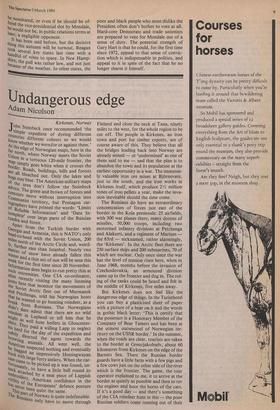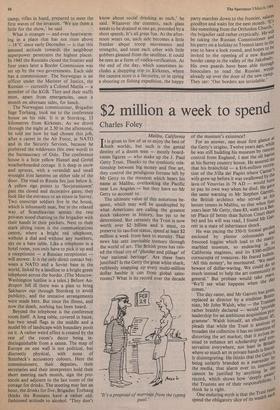Un.dangerous edge
Adam Nicolson
Kirkenes, Norway John Steinbeck once recommended 'the simple expedient of dyeing different countries different colours so we would know whether we werefor or against them.' At the edge of Norwegian maps, here in the far north, where Norway meets the. Soviet Union in a tortuous 120-mile frontier, the —i. at) simply goes White when it crosses the vorder. Roads, buildings, hills and forests are all bleached out. Only the lakes and bogs stay blue. The American military maps of the area don't follow the Steinbeck The green and brown of forests and contours move without interruption into Communist territory, but Pentagoncacar- tographers have printed the words: 'Limits of Reliable Information' and 'Data In- complete, over large parts of the Russian tundra and forest. Apart from the Turkish border with Georgia and Armenia, this is NATO's only head-to-head with the Soviet Union, 200 miles north of the Arctic Circle and, weird- ly, further east than Istanbul. Nearly two mimes of snow have already fallen this and a thin arc of sun will be seen this Week for the first time since 20 November. Information does begin to run pretty thin at such extremities. One CIA co-ordinator, after recently visiting the many listening Posts here that monitor the movements of the Soviet Arctic fleet out of Murmansk Petchenga, told his Norwegian hosts tbnat he wanted to go hunting reindeer, as a drleak, from Russians. The Norwegians
t dare admit that there are no wild
rendeer in Lapland or tell him that he Tight as well hunt heifers in Gloucester- shnire. They paid a willing Lapp to neglect s his herd for the day of the expedition and bu°tIY. directed the agent towards the he bacon
Ar°wsing animals. All went well, the
suspected nothing and eventually bk. bagged an impressively Hemingwayan ase h large furry antlers. When the car- neck earne to be picked up it was found, nertunatelY, to have a little bell round .its e_c,k attached by a neat piece of Lappish virility of American confidence in the
of the Europeans' defence posture '4°,,,never been quite the same.
Thi °Is Part of Norway is quite indefensible. "e Russians only have to move through Finland and close the neck at Tana, ninety miles to the west, for the whole region to be cut off. The people in Kirkenes, an iron town and port for timber exports, are of course aware of this. They believe that all the bridges leading back into Norway are already mined — or 'undermined' as one of them said to me — and that the plan is to abandon the town and its population at the earliest opportunity in a war. The immense- ly valuable iron ore mines at BjOrnevatn, just to the south, and the iron works in Kirkenes itself, which produce 2 1/2 million tones of iron pellets a year, make the inva- sion inevitable should the time come.
The Russians do have an extraordinary concentration of forces just east of the border in the Kola peninsula: 25 airfields, with 300 war planes there, many dozens of missiles, 50,000 troops, including two motorised infantry divisions at Petchenga and Alakurti, and a regiment of Marines the 63rd — nicknamed, rather alarmingly, the `Kirkenes'. In the Arctic fleet there are 230 surface ships and 200 submarines, 70 of which are nuclear. Only once since the war has the level of tension risen here, when in June 1968, months before the invasion of Czechoslovakia, an armoured division came up to the frontier and dug in. The rol- ing of the tanks could be heard and felt in the middle of Kirkenes, five miles away.
But Kirkenes does not feel like the dangerous edge of things. In the Turisthotel you can buy a plasticised sheet of paper with a picture of a bear on it and the words in gothic black letter: 'This is certify that the possessor is a Honorary Member of the Company of Bear Tamers and has been at the utmost outsentinel of Norwegian ter- ritory on the USSR border.' In the summer, when the roads are clear, tourists are taken to the border at Grenzjakobselv, about 60 kilometres from Kirkenes on the edge of the Barents Sea. There the Russian border guards have a little farm with a few pigs and a few cows just on the other side of the river which is the frontier. The game, the tour operator explained to me, it to arrive at the border as quietly as possible and then to rev the engines and hoot the horns of the cars. If it's a good day — and there's something of the CIA reindeer hunt in this — the poor Russian soldiers come running out of their camp, rifles in hand, prepared to meet the first waves of the invasion. 'We use them a little for the show,' he said.
What is stranger — and even heartwarm- ing in a place that has not risen above — 18°C since early December — is that this amused attitude towards the neighbour superpower penetrates the highest places. In 1945 the Russians closed the frontier and four years later a Border Commission was set up by the two governments. Each side has a commissioner. The Norwegian is an officer under the Minister of Justice, the Russian — currently a Colonel Matila — a member of the KGB. They and their staffs meet, apart from emergencies, once a month on alternate sides, for lunch.
The Norwegian commissioner, Brigadier Inge Torhaug, took me to the conference house on his side. It is at Storskog, 13 kilometres from Kirkenes. As we drove through the night at 2.30 in the afternoon, he told me how he had chosen this job, after a career in the Air Force, at NATO and in the Security Services, because he preferred the wilderness (his own word) to the bureaucracy of Oslo. The conference house is a little yellow Hansel and Gretel weatherboarded cottage. It is deep in snow and spruces, with a verandah and small wrought iron lanterns on either side of the door. The road to Russia lies just below it. A yellow sign points to `Sovjetunionen' past the closed and decorative gates; they look like the entrance to an estate in Surrey. Two conscript soldiers live in the house, which is inhumanly neat, but in the relaxed way of Scandinavian armies the two privates stood chatting to the brigadier with their hands in their pockets. Next to their stark sitting room is the communications centre, where a bright red telephone, without a dial and without any numbers, sits on a bare table. Like a telephone in a hotel room, you only have to pick it up and a receptionist — a Russian receptionist — will answer. It is the only direct contact bet- ween a NATO and a Soviet base in the world, linked by a landline to a bright green telephone across the border. (The Moscow- Washington hotline is a telex.) Before An- dropov fell ill there was a plan to bring Sakharov out through Storskog to avoid publicity, and the tentative arrangements were made here. But since the illness, and now the death, nothing has been heard.
Beyond the telephone is the conference room itself. A long table, covered in baize, has two small flags in the middle and a model bit of landscape with boundary posts on it. A rather weird effect is created by the rest of the room's decor being in- distinguishable from a sauna. The map of Europe on one wall is not political, but discreetly physical, with none of Steinbeck's accusatory colours. Here the commissioners, their deputies, their secretaries and their interpreters hold their short meeting each month, sign the pro- tocols and adjourn to the last room of the cottage for drinks. The meeting may last an hour, the drinks for five. Brigadier Torhaug thinks the Russians have a rather old- fashioned attitude to alcohol. 'They don't know about social drinking as such,' he said. Whatever the contents, each glass needs to be drained at one go, preceded by a short speech. It's all great fun. As the after- noon wears on, each side becomes a little franker about troop movements and strengths, and tease each other with little gobbets gleaned from the satellites. It could be seen as a form of vodka-verification. At the end of the day, which sometimes in- cludes a shopping trip to Kirkenes, where the camera store is a favourite, or in spring a shooting or fishing expedition, the happy
goodbye and waits for the next month. 'It s, like something from the Orthodox Church, the brigadier said rather cryptically. He will be taking the Russian Commissioner and his party on a holiday to Tromso later in the year to have a look round, and hopes to be invited to the opening of a new Russian border camp in the valley of the Jakobselv. His own guards have been able through binoculars to read the Russian words already up over the door of the new can1P. They say: 'Our borders are inviolable.'











































 Previous page
Previous page